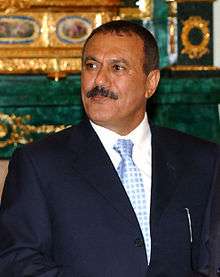Yemeni presidential election, 1999
| |||||||||||||||||
| Turnout | 67.5% | ||||||||||||||||
| |||||||||||||||||
| |||||||||||||||||
 |
| This article is part of a series on the politics and government of Yemen |
|
Legislature
|
| Judiciary |
| Foreign relations |
Direct presidential elections were held in Yemen for the first time on 23 September 1999.[1] Candidates had to be approved by at least 10% of the 301 members of the House of Representatives; however, in practice this meant that only two parties, the ruling General People's Congress (GPC) and Al-Islah had enough seats to nominate their candidates. However, al-Islah backed the GPC candidate, incumbent President Ali Abdullah Saleh rather than running a candidate of their own.
The only candidates that received approval from Parliament were Saleh and Najeeb Qahtan Al-Sha'abi, another member of the GPC. The main opposition candidate, Ali Saleh Obad of the Yemeni Socialist Party, failed to gain enough support in the House of Representatives; his party subsequently boycotted the elections. The reported voter turnout of 67.5% was contested by the opposition.[2]
Nominations
Nominations for presidential candidates closed on 13 July 1999. In total, 31 candidates put their names forward, though three of them were disqualified immediately for failing to meet the legal requirements:[3]
- Ali Abdullah Saleh – supported by the General People's Congress, Al-Islah, National Opposition Council)
- Ali Salih 'Ubad Muqbil – supported by parties in the Supreme Co-ordination Council for the Opposition
- Abd al-Quwi Ahmad Hamoud Shuwi'a – supported by the People's Democratic Party
- Al-Habbani Muhammad abd al-Malik Nu'man al-'Abassi – supported by the Yemeni Popular Unity Party
- Ali bin Ali Sabihi
- Muhammad Muhammad Hizam al-Yamani
- Amin Ahmad Thabit
- Abd al-Wahhab Muhammad Hassan al-Karidi
- Abdullah Salih Salih al-Bakhiti
- Muhammad Ahmad Sa'ad al-Dhufari
- Faisal Ali Ahmad Ghaaithan al-Tawil
- Salih Hassan Abdullah al-'Azani
- Abd al-Malik Yahya Ahmad Hanash
- Ahmad Ali Hussein Yahya al-'Amri
- Muhammad A'id Qa'id al-'Uthmali
- Ali Salih al-Houri
- Muhammad Ali Muhsin al-Sirri
- Salih Ahmad bin Ahmad Jubah
- Muhammad Hussein al-Jamuzi
- Ali Abdullah Salih Muhsin Suroub
- Abd al-Wahhab Qanaf Sha'if
- Mustafa Youssef Khalil
- Iskandar Ali al-Nathari
- Mustafa Ali Naji 'Aiyash
- Ahmad Muslih al-Barti
- Ma'adh Abdullah al-Shahani
- Ahmad Abduh al-Ramim
- Najeeb Qahtan Al-Sha'abi – MP for the General People's Congress, running as an independent
The following were disqualified:
- Amin Ahmad bin Ahmad Thabit (candidates must not be married to a foreigner and he had a Russian wife)
- Abdullah Salih Salih Muhsin Surub (minimum age is 40, he was 38)
- A candidate with a name too similar to President Saleh
The parliamentary vetting committee eliminated another four candidates, putting 24 of the 31 nominations to a parliamentary vote, in which a candidate required 31 votes to be able to run in the elections. Another candidate, Khalid al-Zarraka, did not appear on the publicised list of nominations, but was included in the parliamentary vote. Only two candidates managed to obtain the required number of votes; Saleh and Najeeb Qahtan Al-Sha'abi.[2] Twenty-one of the 25 candidates (including al-Zarraka) did not receive any votes.[3]
| Candidate | Votes | % |
|---|---|---|
| Ali Abdullah Saleh | 182 | 60.5 |
| Najeeb Qahtan Al-Sha'abi | 39 | 13.0 |
| Khalid al-Zarraka | 25 | 8.3 |
| Ali Salih 'Ubad Muqbil | 7 | 2.3 |
| Other candidates | 0 | 0.0 |
| Abstentions | 1 | 0.3 |
| Absent | 47 | 15.6 |
| Total | 301 | 100 |
| Source: Al-Bab | ||
Results
| Candidate | Party | Votes | % |
|---|---|---|---|
| Ali Abdullah Saleh | General People's Congress | 3,584,399 | 96.2 |
| Najeeb Qahtan Al-Sha'abi | Independent | 141,481 | 3.8 |
| Registered voters/turnout | 47,011 | – | |
| Total | 3,772,891 | 100 | |
| Registered voters/turnout | 5,591,422 | 67.5 | |
| Source: Nohlen et al. | |||
References
- ↑ Dieter Nohlen, Florian Grotz & Christof Hartmann (2001) Elections in Asia: A data handbook, Volume I, p301 ISBN 0-19-924958-X
- 1 2 "Election Watch". Journal of Democracy. The Johns Hopkins University Press. 11 (1): 206–211. January 2000. ISSN 1086-3214. doi:10.1353/jod.2000.0001. Retrieved 13 November 2012.
- 1 2 Nominations for the presidency Al-Bab, 20 July 1999

